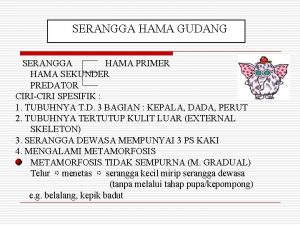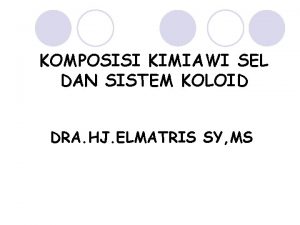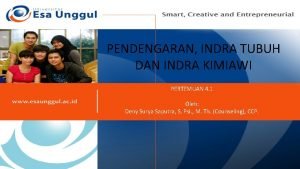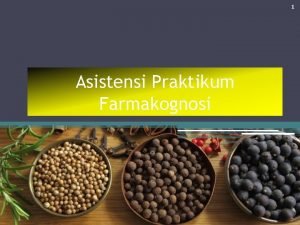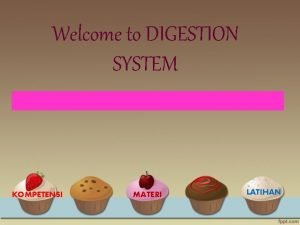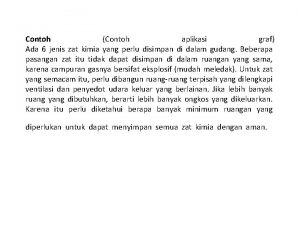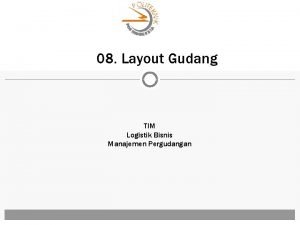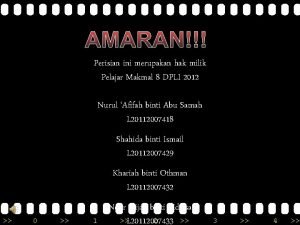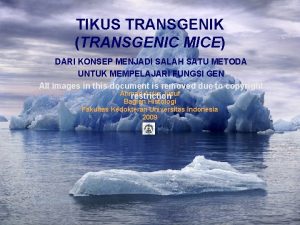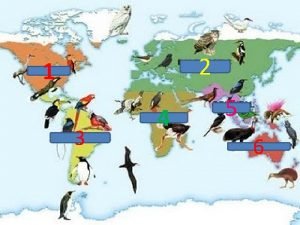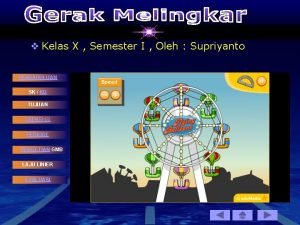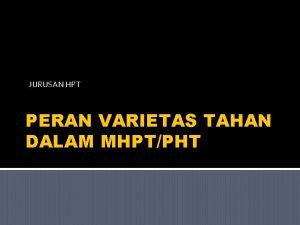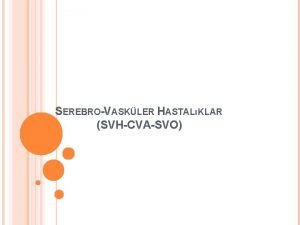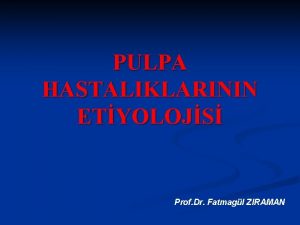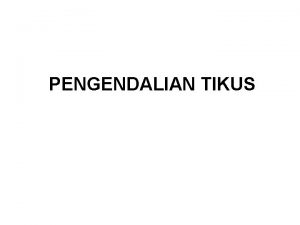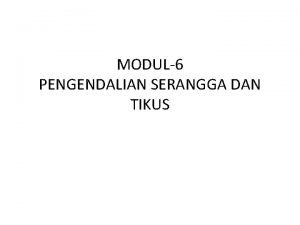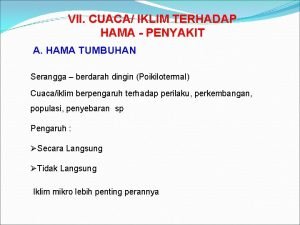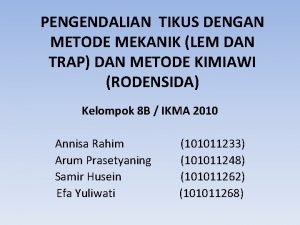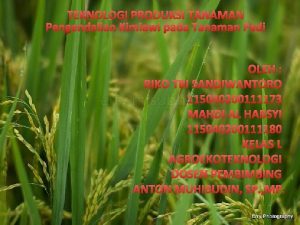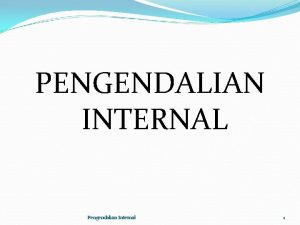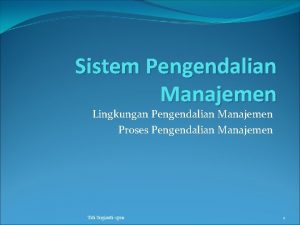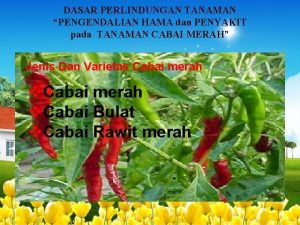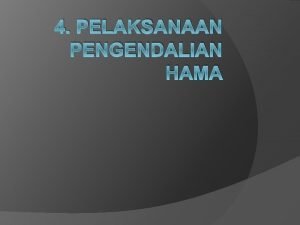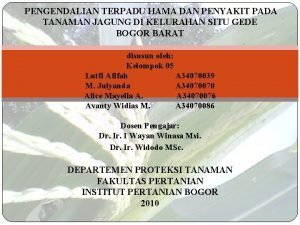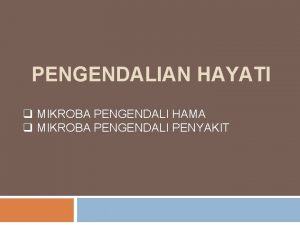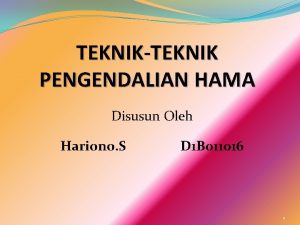PENGENDALIAN HAMA GUDANG Pengendalian kimiawi TIKUS Rodentisida akut
























- Slides: 24

PENGENDALIAN HAMA GUDANG


Pengendalian kimiawi (TIKUS) • Rodentisida akut langsung membunuh • Rodentisida kronis (Anti koagulan) tidak langsung keracunan • Dosis tunggal • Multi dosis • Peletakan tidak terus menerus • Pengumpanan pada jalur masuk • Fumigasi Kelemahan: • • Rodentisida akut menyebabkan keengganan makan umpan Perlu waktu sampai umpan beracun dimakan tikus Bahaya bagi manusia dan hewan piaraan Hanya efektif jika diimbangi dengan sanitasi yang baik

PENGENDALIAN SERANGGA HAMA • Sanitasi gudang dan komoditi (deteksi) • Pendinginan • Disinfestasi dengan panas • Rotasi stok • Impact, pneumatic augers • Residual insecticides • Fumigasi (metil bromida (CH 3 Br), Fosfin (PH 3)) • Karbondioksida



PENDINGINAN • PEMBALIKAN TUMPUKAN • AERASI • PENDINGINAN/CHILLING Rusty grain beetle • - 5 o. C selama 8 minggu • - 10 o. C selama 6 minggu • - 15 o. C selama 4 minggu







Acute mammalian toxicities (LD 50 - mg/kg body weight) for contact insecticides currently of use in stored-Brain insect control

Maximum residue limits (MRL) and acceptable daily intake Levels (ADI) (mg/kg or ppm) recommended by FAD/WHO as at April 1992

FUMIGASI KEUNGGULAN DAN KELEMAHAN FOSFIN DAN METIL BROMIDA Phosphine Methyl bromide Easy to transport Refillable cylinders are expensive to transport Easy to apply Difficult to apply, requiring special equipment and skill Good penetration and distribution Distribution rather poor Taint, residues and loss of viability in treated seeds are generally negligible Sorption occurs and may cause taint, bromide residues and loss of viability in treated seeds Slow acting, particularly at low temperatures and humidities* Rapidly toxic and widely effective even at lower temperatures Flammable: spontaneously explosive ignition can Non-flammable occur in some circumstances High acute mammalian toxicity but low chronic toxicity Dangerous acute and chronic poison with delayed symptoms Fairly easy to detect Very easy to detect Rapidly lost by leakage unless fumigation space is well sealed and gas tight soon after application Needs very good seeing before application * Not recommended for use at temperatures below 12°C. Source: Adapted from Pest Control for Food Security, FAO Plant Production and Protection Paper 63 (Prepared for FAO by ODNRI), FAO, Rome (1985).

Average concentrations of phosphine (mg/l) required to give 100 per cent mortality of all developmental stages of insects under experimental conditions





Pest control techniques: current options

Pest control techniques: current options

Pest control techniques: current options
 Pengendalian hama secara kimiawi
Pengendalian hama secara kimiawi Contoh hama sekunder
Contoh hama sekunder Komposisi kimiawi sel
Komposisi kimiawi sel Indra kimiawi
Indra kimiawi Saponin
Saponin Ptealin
Ptealin Proses pencernaan lemak dan protein dituntaskan di dalam
Proses pencernaan lemak dan protein dituntaskan di dalam Ada 6 jenis zat kimia yang perlu disimpan di gudang
Ada 6 jenis zat kimia yang perlu disimpan di gudang Layout gudang logistik
Layout gudang logistik Gudang tidak menghargai dirinya sendiri
Gudang tidak menghargai dirinya sendiri Gudang gapura angkasa cengkareng
Gudang gapura angkasa cengkareng Asas tata ruang gudang
Asas tata ruang gudang Tikus wirok
Tikus wirok Malayalam actress female
Malayalam actress female Contoh ayat poliklinik
Contoh ayat poliklinik Tikus transgenik
Tikus transgenik Bagi yang menitip sepeda motor harus dikunci
Bagi yang menitip sepeda motor harus dikunci Isolasi ekogeografi
Isolasi ekogeografi Hipostasis dan epistasis
Hipostasis dan epistasis Nokdiak
Nokdiak Sebuah bola lampu mercusuar terletak pada jarak 80 cm
Sebuah bola lampu mercusuar terletak pada jarak 80 cm Ambang ekonomi hama
Ambang ekonomi hama Perkembangan serangga
Perkembangan serangga Serobro
Serobro Pulpitis polipoza
Pulpitis polipoza

